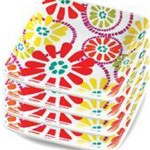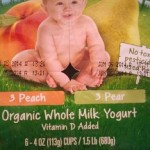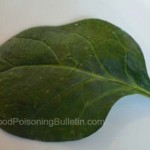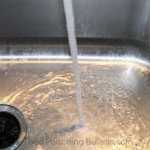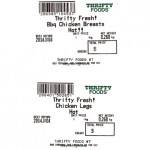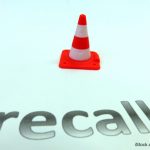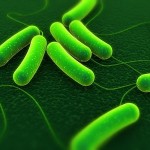Princess House is recalling some of its Marissa Tangerine Appetizer Plates because they may leach cadmium and lead into the food they hold.The heavy metals are contained in the decorative plate decals, and they contain lead and cadmium at levels exceeding FDA and/or California Proposition 65 guidance levels. Not all plates distributed by this company have this problem, but Princess House is recalling all of the Tangerine plates distributed through its consultant and hostess network. No injuries or illnesses related to the recalled product have been reported to date. Only the Tangerine Appetizer Plates are affected by this recall; no other Marissa collection tableware pieces are involved. If you are a consumer with these plates, obtain information about product return and exchange by … [Read more...]
Stonyfield Extends Recall of YoBaby Yogurt
Stonyfield is extending its voluntary recall of YoBaby Peach/Pear Yogurt first issued on April 25, 2014. The recall now includes an addition 1,344 six-packs shipped to 271 more stores. The stores that carry the product are mostly Safeway and Fred Meyer stores in Oregon, Washington, Montana, Idaho, Alaska, and northern California. The yogurts may contain Klebsiella pneumoniae, a bacteria that usually don't cause illness when they are in food, but they sometimes do. The bacteria may have variations in their genes, which could change how they cause illness, along with the severity of that illness. The risk of illness also depends on the health and genetic make-up of the person who eats them. Anyone who does become sick after eating this yogurt can suffer watery diarrhea, nausea, vomiting, … [Read more...]
Research at Texas A&M Studies E. coli on Leafy Vegetables
Research at Texas A&M is looking at E. coli contamination on leafy vegetables. The research looks at how the likelihood that a crop will be contaminated by E. coli before harvest is strongly influenced by both farm management and environmental factors. The study is published in the journal Applied and Environmental Microbiology. Contaminated produce is the most common source of food poisoning in this country. Between 1998 and 2008, of the 68,000 food poisoning illnesses that were assigned to one of the 17 food commodities, 13% were associated with leafy greens. And the number of illnesses caused by leafy greens is increasing, from 6% in 1999 to 11 percent in 2008. The study, led by Dr. Renata Ivanek, cross-referenced environmental data with information from farms in several … [Read more...]
Hazardous Chemical Leaked into West Virginia Water Supply
More than 300,000 residents of West Virginia have been forced to use bottled water since a chemical spill contaminated the water supply in the Elk River. A Freedom Industries plant had a 40,000 gallon tank of 4-methylcyclohexane methanol next to the river. Officials say that about 7,500 gallons leaked into the river, but no one is sure. The West Virginia governor issued a State of Emergency for West Virginia American Water customers in Boone, Cabell, Clay, Jackson, Kanawha, Lincoln, Logan, Putnam and Roane counties, and President Obama signed an Emergency Declaration on January 10, 2013 to authorize federal agencies to coordinate disaster relief efforts. The West Virginia American Water Company has issued a "do not use" order; that means residents cannot use the water for drinking, … [Read more...]
In Canada, Barbecue Chicken Recalled for Chemical Contamination
The Canadian Food Inspection Agency and Thrifty Foods Port Place are warning the public not to consume Nanaimo Hot Barbecue Chicken products because they may have chemical contamination. There is no word on what the contamination may be, and no illnesses have been reported in connection with this problem. The recalled products are all under the Thrifty Fresh! brand name. The products are Whole Barbecue Chicken Regular, whole chickens, with best before date of 2014JA04 and UPC number 774147302203. Also recalled are BBQ Chicken Breasts Hot!! in various sizes, with best before date of 2014JA04 and UPC numbers starting with 286385. Finally, Chicken Legs Hot are recalled, in various sizes, with best before date of 2014JA04 and UPC number starting with 286401. If you do have this product … [Read more...]
Salmonella and Listeria Produce Field Contamination Risk Factors
Red and green bell peppers have been recalled in California for possible Salmonella contamination. That makes this study even more relevant. Applied and Environmental Microbiology has published research about identified risk factors associated with contamination of produce fields with Salmonella and Listeria monocytogenes bacteria. The study found that management practices are crucial to development of effective Good Agricultural Practices (GAPs). Twenty one produce farms in New York state were visited over a five week period for this study. Soil, draw swab, and water samples were collected. In addition, field-management practices were recorded. They found Salmonella in 6.1% of fields, and Listeria in 18.5%. Most of the pathogen-positive water samples were from non-irrigation surface … [Read more...]
Minnesota Officials: Private Well Owners Should Test Water
The Minnesota Department of Health says that private well owners should test their water. Last week was National Groundwater Awareness Week. More than a million Minnesotans get their drinking water from private wells. Many are not tested for bacteria and chemicals such as arsenic and nitrate. Public health officials say that "as many as 25 percent of private wells in Minnesota have detectable levels of total coliform (fecal) bacteria, an indication that surface contamination has entered the well or water system." Private wells should be tested once a year for coliform bacteria. Testing for nitrate should take place every two or three years, or more often if an infant under the age of six months will be drinking the water. Every well should be tested for arsenic at least once. Since … [Read more...]
Ikea Recalls Cakes; Kroger Recalls Bread
Here are the recalls issued by corporations, the FDA, and the USDA for March 5, 2013. Every day we'll collect recalls and alerts and post them so you can keep your family safe. Ikea recalled almond cakes after coliform bacteria found. That bacteria is in fecal matter. Chinese authorities found the bacteria in the product. The company says that 1800 Taarta Chokladkrokant cakes, which are "almond cakes with chocolate, butter crem, and butterscotch" never reached the stores, but were destroyed after Chinese customs authorities found the bacteria and intercepted them. The almond cakes were to go on sale in 23 countries. The Kroger Co is recalling bread made at its bakery in Clackamas, Oregon because it may contain pieces of plastic. The wheat bread was sold at the company's Fred Meyer … [Read more...]
Poland Spring Bottled Water Warning in New Hampshire
The New Hampshire Department of Health and Human Services (DHHS) is recommending that anyone who has purchased Poland Spring 3- or 5- gallon water bottles check them for gasoline odors before using. Clean water should not have any type of chemical smell; it is odorless. After Hurricane Sandy, when gasoline shortages were reported in New York, New Jersey, and Connecticut, some people used large water bottles to hold gasoline. Bottled water companies have since detected returned and recycled water bottles with gasoline residue and fumes. The companies have measures in place to remove those bottles from reuse, but a "very small number" of contaminated bottles did make it through the detection process. Those levels of gasoline are "not likely to result in long-term health effects" … [Read more...]
E. coli Infections Spike After Plastic Bag Ban in California
A study published by the University of Pennsylvania and George Mason University found that a ban on plastic bags by the city of San Francisco has led to an increase in E. coli infections. In the three months since the ban, deaths from foodborne illness in that city spiked by 46%. With plastic bags forbidden, consumers are using reusable bags. While that's great for the environment, most people don't know that the bags should be washed regularly. When they are not washed, they become contaminated with pathogenic bacteria. The study's authors said, "using standard estimates of the statistical value of life, we show that the health costs associated with the San Francisco ban swamp any budgetary savings from reduced litter." In fact, the study found that relative to other counties, … [Read more...]
